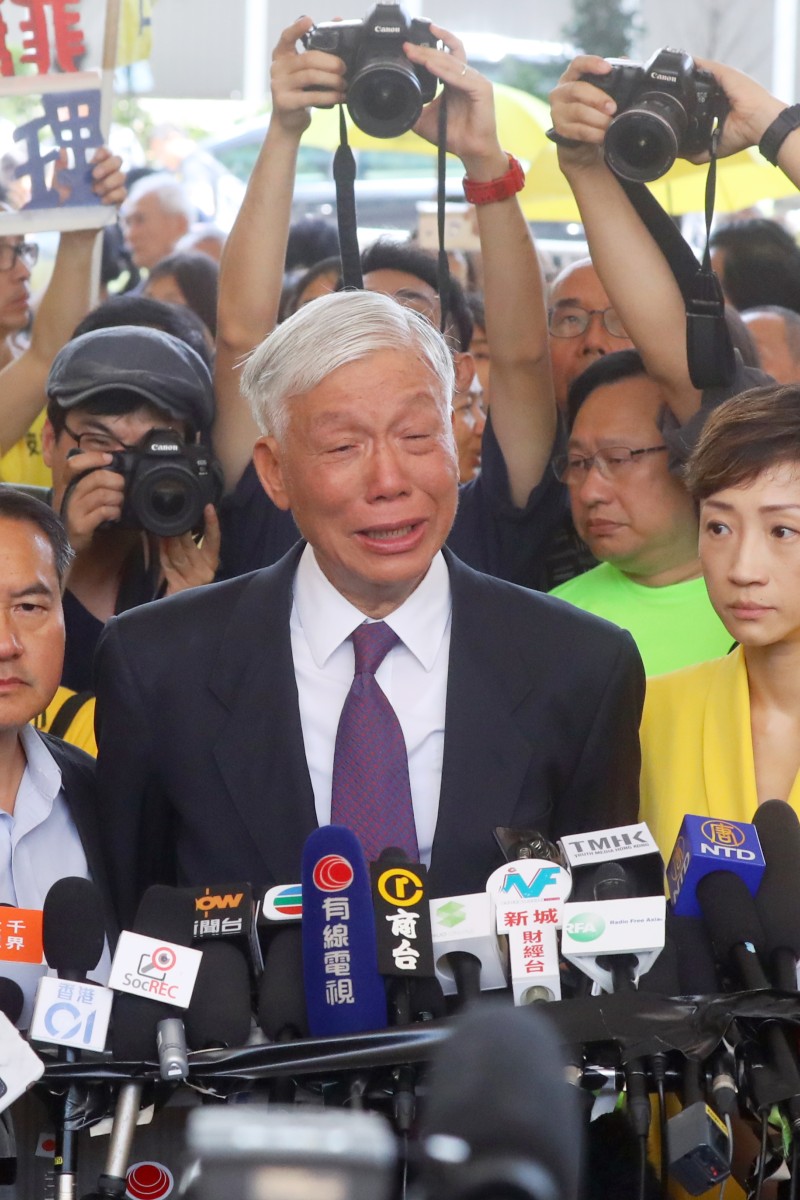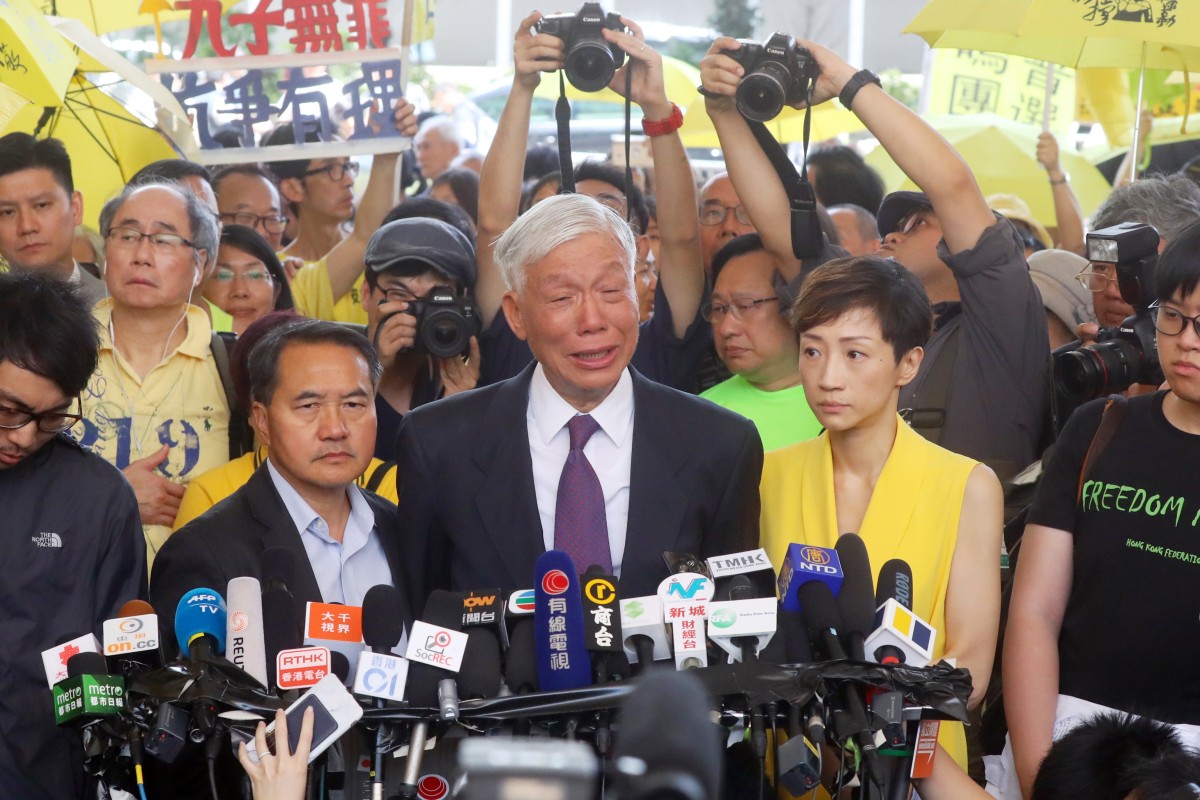
Face Off: Are the nine Umbrella Movement activists’ sentences too harsh?
Each week, two of our readers debate a hot topic in a parliamentary-style debate that doesn’t necessarily reflect their personal viewpoint. This week …
 (From left) Lee Wing-tat; Reverend Chu Yiu-ming; Tanya Chan Suk-chong at the West Kowloon Law Courts Building after learning about their sentences for their roles in the 2014 Umbrella Movement.
(From left) Lee Wing-tat; Reverend Chu Yiu-ming; Tanya Chan Suk-chong at the West Kowloon Law Courts Building after learning about their sentences for their roles in the 2014 Umbrella Movement.Joshua Cheng, 18, HKUGA College
Nine leading Umbrella Movement activists were convicted of public nuisance. Four of them have been sentenced to serve eight to 16 months behind bars. I don’t believe their actions warrant such harsh sentences.
Firstly, what the activists did in the Umbrella Movement was not for their own selfish gain, but for the betterment of society. A lot of Hongkongers were feeling worried as the mainland government’s increasing control over Hong Kong became more apparent. They were anxious it would threaten “One Country, Two Systems” – a policy under which Hong Kong has a high degree of self-rule for half a century after the handover in 1997.
The nine activists saw a need to stand up and let the government know the public was not satisfied with the situation so they launched the movement. None of them have personally gained anything, and because of this selfless intent, jailing some of them doesn’t make sense.
Secondly, the activists did not commit any serious criminal offences. During the movement, and particularly during Occupy Central, minimal damage was done to the surroundings. Throughout the 79 days, occupants carried out their protest in a peaceful manner, and the nine sentenced activists also did not engage in any destructive acts such as battery and assault. Instead, they demonstrated their opposition to mainland control through non-violent means.
Moreover, according to the Basic Law Chapter III, Article 27, Hong Kong residents have the right to freedom of speech, press and publication; freedom of association, assembly, procession and demonstration; and the right and freedom to form and join trade unions, and to strike. Based on this, the nine activists were just exercising their civil rights and freedom to assemble and demonstrate.
The nine of them did, however, acknowledge that part of what they did, such as encouraging people to occupy Central, was illegal and may fall under civil disobedience. Nevertheless, serving up to 16 months for just occupying a small area of Hong Kong is, in my opinion, still too harsh a punishment, they should have received a much lighter consequence, such as a fine or community work.
Joy Lee, 16, South Island School
The 2014 Umbrella Movement still casts a shadow over Hong Kong’s justice system. It was recently announced that nine of the Occupy leaders would be punished for their roles in the protests that took place in 2014, with four of the nine being sentenced to jail for up to 16 months.
Before we jump to the conclusion that the charges placed on the nine activists were too harsh, we must consider the difficult position Judge Johnny Chan Jong-herng, who sentenced the activists, was in. Along with pressure from the mainland government, the international community – including Britain and the US – was also watching to make sure the pro-democracy movement was not undermined. Thus, a good balance had to be struck.
If Chan let the leaders off without any punishment, the Chinese government would lose face, and appear weak and much too lenient. However, if the leaders were punished severely, China would lose face in front of the international community, to whom it was trying to prove itself to be just and fair. The fact that the leaders are serving a mere 16 months instead of the maximum sentence of seven years shows not only leniency on the judge’s part, but also the necessary balance that had to be struck to make both sides happy. Overall, it seems like a fair punishment for the actions that disrupted a whole city.
This is another thing to consider – to claim that the sentences were unjust because they undermined freedom of speech and protest is to forget and underestimate the impact those 79 days had not only on Hong Kong’s international business community, but also on people’s daily lives. Businesses lost hundreds of thousands of dollars, and some local ones even shut down. Some people who took part in the protests were harmed by the tear gas and pepper spray.
By sentencing the leaders, the judge is not undermining the cause that was being protested; rather, the leaders are being punished for the effects of the protest. In an article by South China Morning Post, Chan is quoted as saying: “By regret, I do not mean they should give up their political beliefs or demands. It is an apology that the members of the public rightly deserve from the defendants, but never received.” This statement could not be more relevant to this debate.
Edited by Nicole Moraleda
You might also like:
Hong Kong’s Occupy leaders on trial: who they are and what they’re accused of
